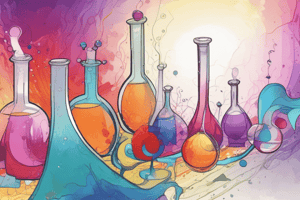Podcast
Questions and Answers
What is the primary focus of analytical chemistry?
What is the primary focus of analytical chemistry?
Analytical chemistry primarily focuses on the identification, separation, and quantification of chemical compounds.
How does chromatography separate components in a mixture?
How does chromatography separate components in a mixture?
Chromatography separates components based on their different affinities for a stationary and mobile phase.
What is the purpose of titrations in analytical chemistry?
What is the purpose of titrations in analytical chemistry?
Titrations aim to determine the concentration of an unknown solution by adding a reagent of known concentration until a reaction endpoint is reached.
Explain the significance of precision and accuracy in analytical chemistry.
Explain the significance of precision and accuracy in analytical chemistry.
What are the key concepts explored in physical chemistry?
What are the key concepts explored in physical chemistry?
Describe the role of thermodynamics in chemical systems.
Describe the role of thermodynamics in chemical systems.
What is the relationship between electrochemistry and chemical reactions?
What is the relationship between electrochemistry and chemical reactions?
How do physical chemists utilize mathematical models?
How do physical chemists utilize mathematical models?
Flashcards
Analytical Chemistry
Analytical Chemistry
Branch of chemistry dealing with identifying, separating, and measuring chemical compounds.
Spectroscopy
Spectroscopy
Analyzing interaction of electromagnetic radiation with matter to determine molecular structure and composition.
Chromatography
Chromatography
Separating mixture components based on different affinities for mobile and stationary phases.
Titration
Titration
Signup and view all the flashcards
Electrochemical Methods
Electrochemical Methods
Signup and view all the flashcards
Qualitative Analysis
Qualitative Analysis
Signup and view all the flashcards
Quantitative Analysis
Quantitative Analysis
Signup and view all the flashcards
Physical Chemistry
Physical Chemistry
Signup and view all the flashcards
Thermodynamics
Thermodynamics
Signup and view all the flashcards
Kinetics
Kinetics
Signup and view all the flashcards
Electrochemistry
Electrochemistry
Signup and view all the flashcards
Quantum Chemistry
Quantum Chemistry
Signup and view all the flashcards
Chemical Equilibrium
Chemical Equilibrium
Signup and view all the flashcards
Free Energy
Free Energy
Signup and view all the flashcards
Reaction Mechanisms
Reaction Mechanisms
Signup and view all the flashcards
Molecular Spectroscopy
Molecular Spectroscopy
Signup and view all the flashcards
Study Notes
Analytical Chemistry
- Analytical chemistry is a branch of chemistry focused on the identification, separation, and quantification of chemical compounds.
- It involves methods and techniques for determining the composition of matter.
- Key techniques include spectroscopy (UV-Vis, IR, NMR, atomic absorption), chromatography (GC, HPLC), titrations, and electrochemical methods.
- Spectroscopic methods analyze the interaction of electromagnetic radiation with matter, providing information on molecular structure and composition.
- Chromatography separates components of a mixture based on their different affinities for a stationary and mobile phase.
- Titrations involve the controlled addition of a reagent of known concentration to a solution of unknown concentration until a reaction endpoint is reached.
- Electrochemical methods measure the potential differences or currents generated by chemical reactions at interfaces.
- Qualitative analysis aims to identify the presence of compounds in a sample, while quantitative analysis determines the amount of a specific compound.
- Applications of analytical chemistry are widespread, including environmental monitoring, forensic science, medicine, and materials science.
- Precision and accuracy are crucial in analytical chemistry for valid results.
- Error analysis is essential for understanding and minimizing experimental uncertainties.
Physical Chemistry
- Physical chemistry bridges the gap between chemistry and physics, exploring the physical principles governing chemical phenomena.
- It explores the fundamental relationships between structure, properties, and reactivity of substances at the molecular level.
- Key concepts include thermodynamics, kinetics, electrochemistry, and quantum chemistry.
- Thermodynamics deals with energy changes and equilibrium in chemical systems.
- Kinetics studies the rates of chemical reactions and the factors influencing them.
- Electrochemistry investigates the relationship between electrical energy and chemical reactions, focusing on electrochemical cells and processes.
- Quantum chemistry uses quantum mechanics to describe the structure and properties of molecules and atoms.
- Concepts such as chemical equilibrium, free energy, reaction mechanisms, and molecular spectroscopy are central to physical chemistry.
- Physical chemists often use mathematical models and computer simulations to understand complex chemical systems.
- Applications include developing new materials, designing better catalysts, understanding biological processes, and predicting chemical reactions.
- Understanding the principles of physical chemistry is essential for other branches of chemistry.
Studying That Suits You
Use AI to generate personalized quizzes and flashcards to suit your learning preferences.




